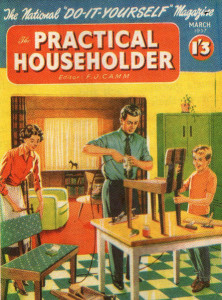
Conservation, recycling and use of resources are considered new ideas, yet former generations were certainly far better at it than we are.
Two world wars gave my grandparents ample opportunity to learn economy. The average worker in those times retired on little more than a basic State pension after a life struggling to keep his wife and children.
My father’s father fell into this category. He was a sweet maker who had managed to earn enough to buy his own house, a typical semi in a quiet street in Lincoln.
My grandmother, like most women in those days, stayed at home to raise her three children: my father, his twin sister Kit and their older brother, Len. My memories of them mainly cover the period after my grandfather’s retirement. Kit, like the other children, had married but her husband had suffered a stroke which left him partly paralysed and unable to work. They reduced living costs by moving in with my grandparents.
Recycling came naturally to the household. The toes of woollen socks wore out rather quickly. My grandmother cut the feet off old socks, unravelling the remaining wool for re-use. She knitted her own socks at incredible speed using three fine double pointed, steel needles.
She applied the same principle to pullovers and cardigans, cutting out bad sections and re-using the remaining wool. I rarely saw my grandmother without knitting needles in her hands. She cut buttons off old clothes, storing them in a biscuit tin. I spent many happy hours as a young child playing with those buttons, fascinated by their variety and number.
Nothing was thrown away thoughtlessly. With glee my grandfather would tell me “the only part of a pig that can’t be used is its squeal”. Facts like that appealed to his nature. My grandfather was a smoker, like many people in those days. He recycled the stubs of his cigarettes, rolling the old tobacco with new in a small machine. We know now, of course, that this was a bad practice since the tar is concentrated in the stubs. Nevertheless he lasted well into his seventies.
The small back garden, dominated by an old apple tree, was mostly dedicated to flowers. Many goods in those days were delivered to your door and even after the war some delivery carts were still pulled by horses. My grandfather would lurk in his front garden whenever a horse was around, ready to shovel up any droppings in an old dust pan for his manure heap. He used other free materials also. The odd lump of coal dropped in the street by the coal-man would be added to the coal bunker. The fires were lit with sticks gathered from the local fields and old newspaper.
Open coal fires caused pollution problems but they did have some advantages. Although by the 1940s they were generally no longer used for cooking, they still came in handy for toasting small items such as bread, buns and chestnuts. Sitting in front of the fire with a toasting fork was so much more fun than using a grill as well as saving gas.
Economy was always the watchword. Take electricity for example: it was used mainly for lighting, the radio and (strictly in emergencies), for a single bar electric fire. Few people had a refrigerator; a freezer was something only Americans possessed. There was no TV and few electrical gadgets.
My grandmother did not even have an electric iron; she used solid irons heated on the gas stove. Her hair curlers were heated in the fire. A hand-pushed sweeper served instead of a vacuum cleaner.
They used lights sparingly, only when it got really dark. It was eerie sitting talking in the sitting room as dusk fell, hardly able to make out the others. Few people owned cars, most manual workers travelled to work by bicycle. The roads were clear enough for them to ride three or four abreast in Lincoln. That was quite a sight when the factories turned out. My grandfather, however, preferred to walk wherever possible. This had the advantage that he could stop to chat to people and establish new acquaintances. Some of these were allotment holders who would let him have surplus crops cheaply or for a small favour.
In spite of this, food was one expense they could not avoid. Home cooking, though, did cut down the cost. There were no expensive “instant” meals, everything was made from basic materials. Meat and vegetable stock was used for soup. Left-overs were utilised in later meals.
All this scrimping and saving seems to imply that my grandparents led a rather dreary life of poverty. This was not my impression. They owned their own house. They were never in debt. My grandmother had enough money left over from her pension to give me a little when we visited every couple of weeks or so.
My grandfather pursued his interest in football, had a small flutter on the pools each week and, when grandma permitted, downed the occasional pint at the pub. They wanted for none of life’s essentials.
I enjoyed my visits immensely; playing with buttons, cards, cotton reels and other simple items and going for endless walks with my grandfather. I wonder if children of today, for all their hi-tech toys, enjoy themselves as much?
John Howden








